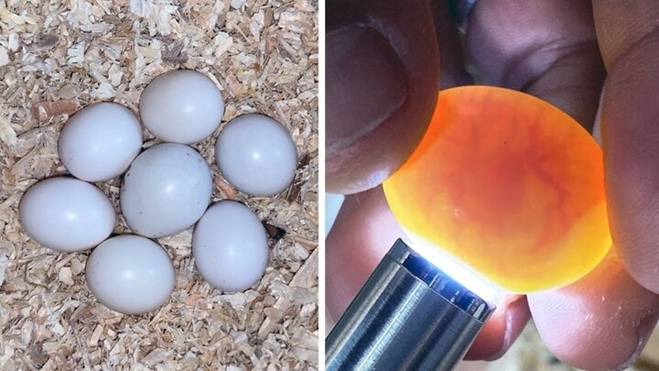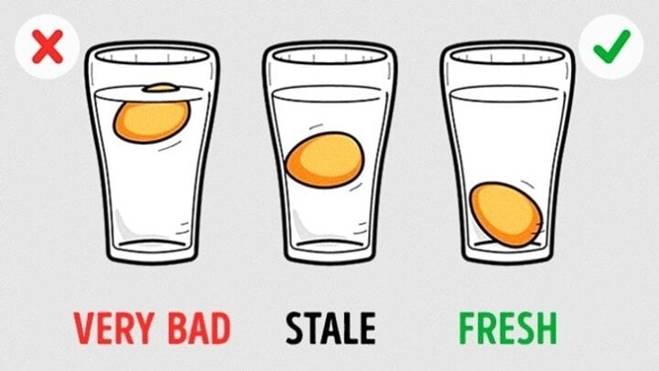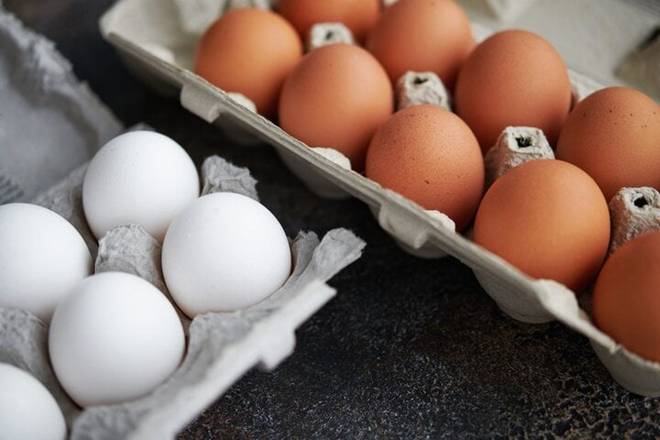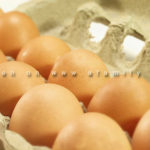Eggs stored for a long time or poorly preserved will decrease in quality and nutritional value, and may even be spoiled or rotten. Therefore, you need to know how to distinguish between fresh eggs and old eggs.
How to tell if eggs are too old
To avoid ruining your cooking plans with bad or low-quality eggs, you need to consider the following suggested methods for identifying old eggs.

Observing the eggshell is a way to tell if eggs are too old. (Photo: Mymrgrocery)
Observe the eggshell
This is the easiest method to determine if eggs are too old. Look at the eggshell, if you see a thin layer of white powder, it means it is a fresh egg. Old eggshells are usually shinier, without the thin layer of powder on the outside, and may have scratches, cracks, or a change in color. They do not look as fresh.
Hold and touch the eggshell
Hold two eggs in your hands and feel their weight. The heavier one is the fresh egg, while the lighter one is the old egg.
When touching the shell, if you feel it is rough or grainy, it is a fresh egg. Smooth and silky shells are old eggs or possibly eggs that have been bleached.
Gently shake the egg
Hold the egg up, place it close to your ear, and shake it gently; if you hear a sound, it means the egg is old. If the egg moves a lot and you hear a sound like water, it means the egg is spoiled. If you shake it and don’t hear a sound, it means the egg is fresh.
Candle the egg with a light source

Candling the egg with a light source is a fairly accurate way to tell if eggs are too old. (Photo: Egg Candling)
Hold the egg up to the sunlight, you will see the inside. If the empty space inside the eggshell (air chamber) is small, the yolk is not moving, and the white has no veins, it is a fresh egg. If the air chamber is large, the white has many veins, it shows the egg is old and should not be bought.
Smell the egg
Checking the smell is a simple and reliable way to tell if eggs are too old and spoiled. Spoiled eggs have a distinct smell that cannot be mistaken, whether raw or cooked.
If you cannot determine when the egg is still in the shell, try cracking it onto a clean plate or bowl and smelling it. If it has a foul odor, discard it and rinse the dish with hot water and soap before using it again.
Float the egg in water

Floating the egg in water is a commonly used method. (Photo: Brightside)
This is a widely used method to determine if eggs are too old. Pour water into a cup, then gently place the egg in it. If the egg sinks, it means it is fresh. If it tilts or floats, it is an old egg. Eggs that are not fresh but not too old will float in the water.
When observing, if you see the pointed end of the egg pointing downwards, it is a fresh egg, while a larger end pointing downwards indicates an old egg.
Some notes for egg storage
Do not store eggs in the refrigerator door because the door is opened frequently, causing unstable and unpredictable temperature changes that can quickly spoil the eggs. The best way is to put the eggs in a carton box and store them in the refrigerator door compartment.
When you bring eggs home, they should be thoroughly washed and then wiped dry with a clean cloth before being placed in the refrigerator for storage.
After taking eggs out of the refrigerator, they should be used within 2 hours. At room temperature, the egg’s coolness begins to dissipate, creating a thin layer of dew on the shell that can easily spoil the egg.
The recommended storage time for eggs in the refrigerator is usually from 3 to 5 weeks.
Tips for distinguishing between native and industrial eggs

(Photo: Taste of Home)
Native eggs have a delicious taste and are rich in nutrients, so they are sold at a higher price than industrial eggs. Due to the profit, many sellers use acids to bleach industrial eggs in order to pass them off as native eggs.
To avoid being deceived, when buying eggs, observe the external appearance carefully. Industrial eggs are always bigger and heavier than native eggs. Native eggs are small in size, naturally yellow in color, and sometimes still dirty from manual farming methods.
Bleached industrial eggs have a thin shell, making them more prone to breaking and spoiling. In particular, when cooking, if you see that the egg white is not translucent, but rather white or clumpy, it is best to discard it as it may be contaminated with bleaching chemicals.
Source: VTC news







































